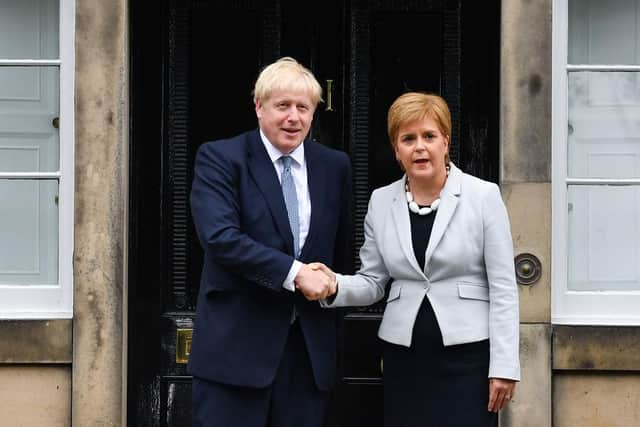Scottish Independence: Exactly how much money does Scotland contribute to England and what is the Barnett Formula?
The prospect of a second referendum and the break-up of the Union has reignited discussion over how the UK’s public finances function and whether or not Scotland benefits from the status quo.
Here is everything you need to know about Scotland’s tax contributions, UK Government spending in Scotland, and the Barnett formula.
How much money does Scotland contribute to the UK in taxes?
Advertisement
Hide AdAdvertisement
Hide AdAccording to the 2018/2019 Government Expenditure and Revenue in Scotland (GERS) report, tax revenue in north of the border amounted to around £66 billion.
That figure includes North Sea oil revenues.
How much money does Scotland receive from the UK Government?
In 2018/2019, Scotland received about £81 billion in public spending, according to GERS.


That means the UK Government spent an additional £15 billion in Scotland as a whole, than it collected from the country via taxes.
The Westminster Government is able to achieve this because it pools tax revenues taken from across the four UK nations, before the money is re-allocated to each as public spending using a formula invented by Labour politician Joel Barnett in the 1970s.
Does Scotland take more than its fair share of UK public spending?
It is difficult to say whether Scotland gets an unfairly high proportion of UK public spending.
While the UK tax revenues raised in Scotland are currently lower than the amount of funding the country benefits from, this has not always been the case.
In 2013, Professor Brian Ashcroft at the University of Strathclyde studied experimental figures from the Scottish Government and found that extra spending per capita on Scotland was almost exactly cancelled out by extra tax revenue between 1980/81 and 2011/2012.
Statistics for more recent years are not available.
What is the Barnett formula?
The Barnett formula is used to work out the level of public spending for each of the devolved administrations.
Advertisement
Hide AdAdvertisement
Hide AdDevised by Labour politician Joel Barnett in the late 1970s, it calculates the annual increase - or indeed decrease - in the money allocated to each country in the UK.
The formula only determines the yearly change in funding, not the whole amount of the grant.
It aims to be fair mechanism by giving each of the devolved administrations the same pounds-per-person change in funding.
Why is the Barnett formula controversial?
The formula, which is more of a convention rather than a legal obligation, was only intended to be a temporary solution to settle arguments over spending in the late 1970s.
Much of the criticism of the formula is down to the disparity in allocations between the nations, which is usually because it takes the size of each into account.
For example, in 2012-13, spending per head in England was £8,529, in Scotland it was £10,152, it was £9,709 in Wales and £10,876 in Northern Ireland.
Are there plans to replace the Barnett formula?
In 2009, a Westminster select committee on the Barnett Formula called for a new system which allocates resources to the devolved administrations based on an explicit assessment of their relative needs.
MPs argued that devolved administrations that have greater needs should receive more funding, per head of population, than others.
Advertisement
Hide AdAdvertisement
Hide AdThey also said a new system “must above all be simple, clear and comprehensible” and be able to respond quickly to “changing needs across the United Kingdom.”
As yet, there are no concrete plans to replace the Barnett formula, though the option may look more attractive to ministers in the wake of the coronavirus pandemic.
A message from the Editor:
Thank you for reading this article. We're more reliant on your support than ever as the shift in consumer habits brought about by coronavirus impacts our advertisers.
If you haven't already, please consider supporting our trusted, fact-checked journalism by taking out a digital subscription.
Comments
Want to join the conversation? Please or to comment on this article.
